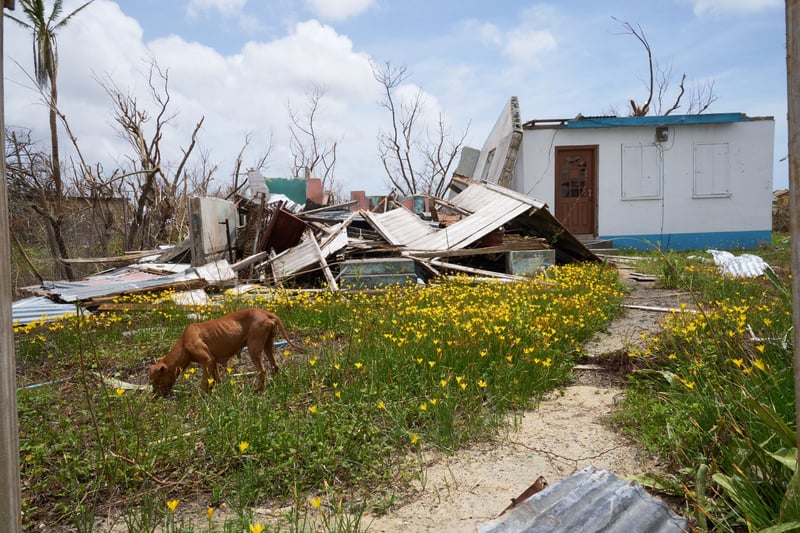
Animals in the Caribbean fight to survive amongst Hurricane Irma’s destruction
Press release
Barbuda: the strange world where only animals remain on a tiny island
In the wake of Hurricane Irma, the situation for animals on the Caribbean island, Barbuda is dire. Animal carcasses are everywhere and those that have survived are fending for themselves, says international charity, World Animal Protection.
The organisation has several teams deployed to Antigua & Barbuda, Jamaica, St Maartens, Haiti and now heading towards Turks and Caicos, as well as monitoring animal needs, remotely working with local organisations and veterinarians across other countries in the Caribbean.
Juan Carlos, global disaster response manager says:
“Our teams were ready and on the move hours after the strongest Atlantic hurricane in history hit – we have built a triage of countries and landed in or are on the way to three of the most affected to help animals suffering.
“The first team arrived in Barbuda, a now eerie island with no people but only animals roaming around and fending for themselves without their owners.”
The charity’s disaster response teams report back from the tiny island of Barbuda with the news of devastation – sheep, goats, horses, cows, pigs, feral donkeys and dogs are everywhere.
Animals left alone on the island experienced the impact of the hurricane first hand with wind speed of 160mph that would be impossible to stand in, flying debris and water levels rising that they would have inhaled causing them extreme stress, injuries and exposure to disease.
Steven Clegg, global disaster response manager in Barbuda says, “People were forced to evacuate after Hurricane Irma destroyed or damaged 95% of the buildings here. They were not allowed to take their animals or don’t have homes in Antigua to keep their cherished pets.
“We’re working tirelessly to quickly ease the suffering and hunger on this grim ark of an island where only animals remain.”
The team are on the ground with local partner Antigua and Barbuda Humane Society to:
provide immediate assistance to animals on the ground injured from the hurricane and meet basic needs for survival. This includes veterinary care, shelter and feed.
assess the wider and longer term needs for the animals in partnership with the governments of the affected states.
While disaster response rightly prioritises people’s immediate needs, the long-term recovery from disasters is inextricably linked with the well-being of their animals.
Communities and people affected by the floods across the Caribbean depend on livestock to make ends meet and as the recovery process begins, saving animals will provide stability for their future.
World Animal Protection is calling on governments to safeguard animals by including them in their national and local disaster management plans.
ENDS
Notes to editors
For more information, photos and videos or to arrange an interview please contact Jonaid Jilani at jonaidjilani@worldanimalprotection.org
Images and b-roll available.
Emergency Vet Kit items for this work are focused on wound dressings and treatment for wounded animals, treatment of diarrhea, pneumonia and other potential post flood disease. Within the kits will be the following, though not limited to this list: Cephalexin; Deworming: Albendazole; Deworming: Ivermectin; Enrofloxacin; Multivitamin: injection; Oxytetracycline; Sulpha trimethoprim; Wound spray. Both pet and livestock feed will be included in the emergency vet kits but quantity and ratio is TBD.
About 1 billion of the world’s poorest people rely on livestock and other animals for food, transport and their livelihoods. Pets are beloved family members and provide valued companionship.
World Animal Protection has been working actively with governments, communities and individuals in disaster management since 1964. Out of 250 disaster responses across 50 years, we have provided aid to over 7 million animals.
World Animal Protection promotes preparedness on the part of animal owners right up to national governments. We work with governments such as Mexico, Costa Rica and India to ensure animals are incorporated into national and local disaster management plans. We are here to support governments in safeguarding its animals and the communities that depend on them from future disasters.
Steven Clegg, global disaster response manager in Barbuda says, “People were forced to evacuate after Hurricane Irma destroyed or damaged 95% of the buildings here. They were not allowed to take their animals or don’t have homes in Antigua to keep their cherished pets. “We’re working tirelessly to quickly ease the suffering and hunger on this grim ark of an island where only animals remain.